- Home
- Chris Ryan
The Kremlin Device gs-3 Page 3
The Kremlin Device gs-3 Read online
Page 3
Johnny Pearce, as I said, was as tough as they come: a fearsome kick-boxer and an ace mountaineer. No doubt his physical nature, and the many hours he spent in the open air, contributed to his ruddy complexion.
Last, but of equal calibre, was Pete Pascoe, the carrot-headed Cornishman, whose special skill was signalling. He, too, was an excellent all-rounder, his one defect being his volatile temper. In his first years with the Regiment this had been a real handicap, and he'd almost been RTU'd after he rammed a civilian car in the outskirts of Hereford. He claimed his brakes had locked and he'd skidded on a wet surface, but he only just escaped prosecution. Afterwards he had admitted that the fellow he bumped had been knocking off his girlfriend while he was away on a Squadron trip. Now though, at the ripe old age of twenty… seven, he was calming down a bit and had become more reliable.
Our first action, when we heard about the Russian job, had been to put the team on an intensive language course, so that by the time we went across we'd at least be able to exchange courtesies with our opposite numbers and read Cyrillic script.
Personally I found the language a pain, because so many of the characters were similar, which made words hard to read, let alone understand. But the lessons were enlivened by our Russian teacher, Valentina, a big, dark woman in her fifties, with steelrinimed spectacles, a lot of teeth, and hair pulled back into a short pony-tail. Three times a week she swept in from London, gave us hell laced with smutty jokes, and swept out again, a whirlwind of energy. The only person who didn't like her was Pete: she teased him once too often when he forgot something basic, and although he didn't actually flare up at the time, for ever after he referred to her as BOB: the Bloody Old Bitch.
Lectures from a member of the Firm introduced us to the Russian Mafia. The main point seemed to be that it wasn't a single organisation like its namesake in Sicily, under the control of one godfather, but comprised a whole lot of criminal gangs battling each other for supremacy. Since Russia had converted to a free-market system, our informant told us, every kind of racketeering had broken out: by sheer power of money the Mafia had risen above the law and made themselves impervious to normal justice. The police couldn't control them, and corruption was spreading through every kind of business.
"Once the disease had taken a hold," the guy from the Firm had told us, 'there was no stopping it. Now it's even eaten its way into government.
Leading politicians are being bribed and pressured and threatened. If they don't play ball, they're eliminated. There's a real fear in Western capitals that the whole of Russia is soon going to be ungovernable."
Within a week of the request for a training team, we'd set a timetable. A recce party consisting of my seW Whinger and Rick would fly to Moscow on 15 September and spend a day checking the facilities of the camp and training area. We'd return on the seventeenth and have three weeks in which to make final preparations. The whole team, with all our kit, would go out early in October.
Before any of that, though, the Russian course leader, Major Ivanov, was due to spend a couple of days seeing how we did things in Hereford and as his opposite number I went to meet him off the plane at Heathrow.
I cut it a bit fine. By the time I'd put my car in the stack and walked over the bridge into the Terminal Two arrival area, Aeroflot's flight 5U247 from Moscow had already landed and passengers with hand luggage only were coming through the Customs screen. By arrangement, I was carrying a white square of cardboard bearing the word ACTIVE in big black capitals, and I stood by the barrier holding it in front of my stomach.
In the end it wasn't needed, because I spotted my guest before he saw me: a big fellow, a good six feet, and broad with it, walking very upright. He had a wide forehead with mid-brown hair swept across it, a rather flat face, and a quick, alert look as his gaze swept back and forth across the waiting crowd. I also noticed a fuzzy vertical scar on his left temple. As he came towards me I had time to think that in the old days you would have expected a Russian officer to carry duelling scars, but this one was clearly the result of a burn.
The guy was wearing jeans and a black leather jacket that looked rather expensive, and was carrying a hold-all slung over one shoulder. As he drew level with me I raised my right hand to attract his attention, and said, "Major Ivanov? Zdravstvuite."
He stopped, focused on me and said, "Sergeant Major?
Zdravstvuite." His face broke into a smile, revealing that his two front teeth were made of metal, and he said, "Vui gavarete pa Russki?"
The words slipped out so fast that I took a second to recognise them. Then I managed, "Nemnogo."
"Khorosho!" He looked delighted. We shook hands over the barrier and I motioned him towards the exit. As he came through, he fired off something else in Russian, and my bluff was called.
"Sorry," I went.
"When I said nemnogo, I meant it. Only a very little."
He smiled again and said, "Doesn't matter. I speak English
OK."
I tried to take his hold-all off him but he wouldn't let me, and we set off for the car. He walked fast, with a springy gait, and I could see straight away that he was fit.
"Good flight?"
He shrugged.
"The pilot he landed it like a ton of shit."
"But you survived."
He smiled.
"It remind me of when I get these teeth. Hard landing in Siberia. Into seat before."
He was all eyes as we walked out on to the third floor of the stack, past ranks of shiny new vehicles.
"Cars!" he exclaimed.
"Such types of cars!"
"This is ours." I unlocked the Passat, opened the boot and put his bag inside. Automatically he made for the right-hand front door.
"This side." I pointed.
"Excuse me!"
"Rassat," he said as he ran a finger over the car's logo.
"It's a P," I said.
"Passat."
"Of course! He is English?"
"German.~ Soon I realised that, although he spoke English with fair fluency, he had trouble recognising letters, as if he'd picked up the language by ear, rather than by reading. I could see him mouthing words to himself as we passed the hoardings. I had to stop myself smiling at his accent, which was tremendously Russian. His Hs were very hot: he pronounced Os like As, and jacked Y sounds on to the front of Es — prafyessional. He also made 'kill' into keen. His L's were beautifully liquid, as if he were rolling a mouthful of vodka round the back of his tongue.
In a few minutes we were heading west on the M4.
"Your first time in the West?"
"How come you speak English so well?"
"I learn in school. Also from American attached to our unit."
"I see. Can I call you Alexander?"
"Sasha, please. Sasha is small name of Alexander. The diminution. Your name is George?"
"Geordie. That's a kind of diminutive, as well."
"Khorosho! And second name?"
"Sharp."
"That is family name. I mean patronymic."
"What's that?"
"Your father name. My father is Vassily. So I am Aleksandr Vassilyevitch Ivanov. Your father is.
"Was. Michael, I think."
"You think? You don't know?"
"I never knew him."
"I am sorry. Well anyway, you are Geordie Mikhaiovitch."
His accent made him pronounce my name "Zheordie', but who was I to complain? His English might be fractured, but at least he could get along in it whereas my Russian was limited to about twenty words.
Already I liked his enthusiasm, the keen interest he took in everything he saw for instance, the surface of the motorway.
"This street!" he said.
"He is vary good. Our streets are full of holes. Cars soon break. The suspenders always breaking."
Another thing that fascinated him was the smallness of the suburban houses, and their gardens.
"How many families live in such a house?" he asked, pointing at
a row.
"Those are what we call semis semidetached, two joined together. Two front doors, you see. Probably one family in each side."
"In Russia we have all big house. Not like this." He saw me glance across and said, "Apartment blocks. Fifteen, twenty pieces high. These are like izbas."
"What's that?"
"Izba is old house in the country. Peasant house."
"A cottage?"
"Yes, but very old. And such a house…" He gestured at a thirties villa standing in a large garden.
"This belongs to government?"
"No, no. I'm sure it's private. A private individual. I think I read somewhere that you can buy houses in Russia now.
"Yes it is just starting."
"And land? Could you buy a farm, for instance?"
"By no means. No land can be sold, except for gardens."
The afternoon traffic was light and the fast lane was often clear, but I kept my speed down to eighty and let the BMWs whip past. I explained the system of number-plates: how S indicated the current year, just started in August, that next autumn there'd be a scramble for Ts, and that freaks paid huge sums for special numbers. Just at the right moment to illustrate my point, we were overtaken by a hell-driven Peugeot 205 with the number PiNTA.
We started to compare British and Russian special forces, and I asked about the base at Balashika.
"It is home of our famous Dzerzhinsky division. That belongs to Ministry of Interior. They have many facilities at Balashika.
Beeg strelbilshze."
"Barracks?"
"Nyet. Barracks is kazarma. Strelbilshze is ranges. Beeg ranges, beeg training area. Between town and forest. Town this side, forest this side. Only thirty kilometres from Moscow, to the east. All behind concrete fences."
"Fences?"
"Walls. Concrete walls, two metres tall. From outside you see nothing."
When I brought up the subject of the Mafia, he instantly became indignant and twisted round in his seat to look at me.
"They keen everybody! Half the population has become what we call vor v zakone. That means "thief in the law". In other words, creeminals.
"They keen businessmen, bank managers, property men anyone. Last year they even kill Larisa Nechayeva!"
"Who?"
"Nechayeva? Boss of Spartak football club. They shoot her in her dacha, her country house. Another woman with her. And why? Beecause she refused to pay them money. Also they kill
Valentin Sych, ice hockey president."
"What's the motive?" I said.
"Why kill all these different kinds of people?"
"Marney!" Sasha held up his right hand, rubbing thumb and forefinger together.
"Marney, marney, marney! Everyone wants more. Always US dollars. Russian money no good. You know how we call it? Deregannye den gi or deregannye rubli. That means wooden money, wooden roubles. Throw it in the stove!"
"But you've just had a revaluation. Didn't they divide by a thousand?"
"Konechno. Of course. Before, it was seven thousand roubles to one dollar. Now it is seven. But what is the difference? Prices are still crazy. No change."
"These murders who's carrying them out?"
"Contract killers. Almost all. With one bullet, a man can earn half million dollars." He looked at me and went on in a soft, menacing, ingratiating voice: "Eemagine. You are manager of bank, big boss, yes? Somebody telephones.
"Look, Meester Sharp, you should pay us some marney." You tell them, "Get to hell."
"Another call.
"You know, Mr. Sharp, you are in danger. You need pratyection. We do not like you to be hurt. We can pratyect you. We can look after your family. But it will cost you: two percent. Two percent of bank takings a lot of money."
"Again you say, "Get lost."
He paused, and when he went on, his voice was even more reasonable, more wheedling, more sinister.
"A week passes. Another call.
"Now look, Meester Sharp. Are you not concerned for your safety, for your little children, for their lives?"
'"No," you say.
'"All right, then. Wait. Wait. Just wait."
"You think you are safe. Why? Because you have closed circuit TV on your block. You have modern security system.
You have former KGB on duty outside. But you are under terrible pressure from your bosses to resist the threat, from the criminals to pay.
"Then one morning you go out to your car. Sunny day. Very nice. Guards are sitting there. Only twenty-five metres to walk, but that is enough. BASH! Bang! The contract killer fires one shot from his car finish."
"Nasty," I said.
"Is very bad, and always getting worse. Now all politicians are in danger, even the President and the Prime Minister."
"That's why we're coming over, I guess."
"Konechno."
He gave me such a long run-down on Mafia activities that we reached camp almost without noticing it.
"Here we are," I said as we turned in towards the gate.
"Welcome to Stirling Lines."
The police on security duty had been briefed to expect him, and I checked him through without difficulty. Then we headed for the officers' mess, where a room was booked. At that time of the afternoon the place was deserted except for Larry, the steward, who was busy cleaning the regimental silver, so I took Sasha through to show him his room, which was small but cheerful, with a shower and lavatory cubicle attached.
"Even own bathroom!" Sasha grinned. Then, pointing at the washbasin, he recited a little poem: "Tolko pokoynik, Ne ssit v rukomoynik."
"What's that?"
"It is joke about Russian hotels. Usually bathroom is a kilo metre away along passage. It means, "Only a dead man does not piss in the basin."
He was delighted with the accommodation; but when we got back into the anteroom, with its sofas and armchairs and little tables, and scenes from regimental history on the walls, he became nervous.
"Zheordie," he said.
"I am shamed."
"What's the matter?"
"This place…" He gestured round the room.
"My clothes…" He looked down at himself, pointing to his black jacket, his faded jeans, his ancient trainers.
"Not smart."
"Don't worry. Everyone's very relaxed round here. No formality."
"Perhaps…"
Still he looked anxious, so I said, "Tell you what. I'll run you into town and we can buy you some new stuff at Marks and Sparks." I saw him hesitate, and explained, "That's a chain store.
Good cheap clothes. Have you got money?"
He produced his wallet, opened it and fished out some notes.
"This is enough?"
He had two flyers and two ten-dollar notes.
"Is that all you've got?"
He nodded.
Jesus! I thought.
"Zheordie, you must understand. In the army, now, we do not get paid. Five months, no marney.
I stared at him.
"In that case, we'll get you something."
"No, please. You should not pay."
"Not me the system. There's a fund for this sort of thing. I can square it away.
I dived into my room in the sergeants' mess to pick up a chequebook. Thus equipped, we drove into town and got Sasha kit ted out with a lightweight, dark-blue blazer, grey slacks, a pair of black moccasins, a couple of shirts and a tie. The bill came to nearly 200, but I knew I could recover the money from Bill Tadd, the quartermaster.
By 5:30 we were back in camp, and I realised that to Sasha it was already 8:30 so I suggested that he had a shower and got his head down for an hour before I came back and collected him for supper.
The meal went fine. There were one or two young ruperts about, but we two sat in a corner of the dining-room and no one bothered us. Sasha's new gear did him proud. He couldn't help preening himself a bit, shooting the cufTh of his pale-blue shirt and brushing invisible bits of fluff off the sleeves of his blazer.
As
we chatted it became apparent that he'd had quite a lot of fighting experience more than I had. One of the pictures on the wall was of the Jebel Akhdar in Oman, where the Regiment had won a famous victory in the fifties, and it set him reminiscing about Afghanistan, where he'd been posted for a year in hellish conditions. The mountains, he said, looked very similar but in contrast with the heat of the Gulf, the winter cold in Afghanistan had been horrendous.
Towards the end of the meal, though, our conversation became rather stilted. Several times Sasha didn't understand something I'd said, and he seemed to be preoccupied with his behaviour, eating his cheese carefully and often glancing round.
So I proposed we go out for a couple of beers and his mood lightened again.
The main thing was to steer clear of other guys from the Regiment and of the local slappers, whose intelligence network is shit hot. Bush telegraph keeps all the Hereford talent fully informed about who's who and who's where who's on the standby squadron, who's on the SP team and so on. The last thing I wanted was for those women to see a Russian walking around with me in the evening so we drove off to the Lamb, a pub in one of the outlying villages, and Sasha put down his first pint of Theakston's Old Peculier like he hadn't had a drink in months.
With the beer came relaxation.
"Cheers!" He raised his glass for the third or fourth time.
"Tell me your family. You are married?"
"No. I was. How about you?"
"The same."
"What happened?"
"My wife she was killed."
"I'm sorry. How?"
"She was shot. It was street battle. Some Mafia persons were shooting a bank manager from their car. They keel led him, but also three persons on the pavement. Olga was one.
"An accident, then?"
"By no means!" He turned on me indignantly.
"On purpose.
The Mafia keen all witnesses."
He paused before adding, "Olga came from Alma Ata, in Uzbekistan. That was her home."
"You didn't have children?"
"She was pregnant. Six months. I think it was a boy. My son.
"When was this?"
"Ninety-three.. ninety-four. Four years ago.
"Well that makes two of us."
"Excuse me?"
"My story's much the same.

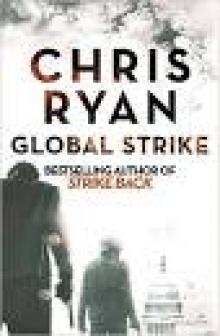 Global Strike
Global Strike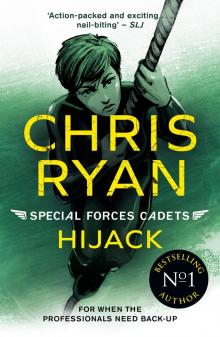 Hijack
Hijack Special Forces Cadets 2
Special Forces Cadets 2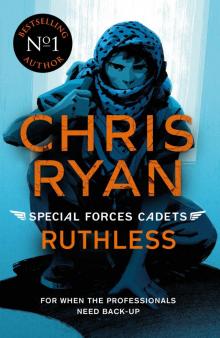 Ruthless
Ruthless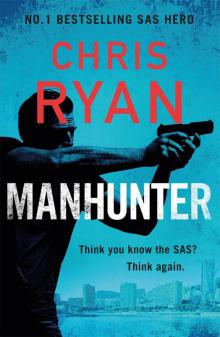 Manhunter
Manhunter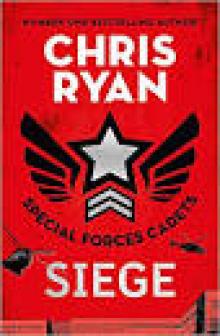 Special Forces Cadets 1
Special Forces Cadets 1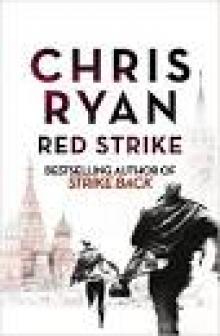 Red Strike
Red Strike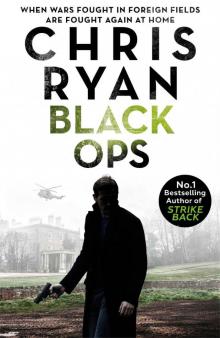 Black Ops
Black Ops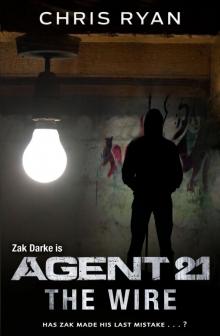 Agent 21: The Wire
Agent 21: The Wire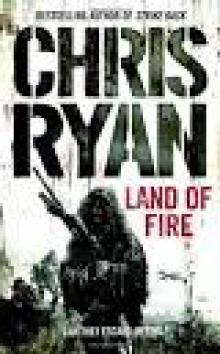 Land of Fire
Land of Fire Alpha Force: Fault Line
Alpha Force: Fault Line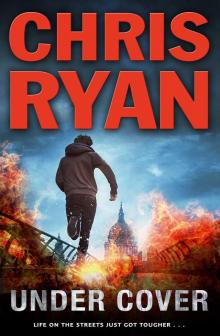 Under Cover (Agent 21)
Under Cover (Agent 21)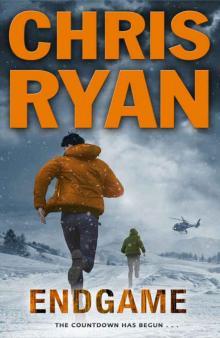 Endgame (Agent 21)
Endgame (Agent 21) Red Centre
Red Centre Blackout
Blackout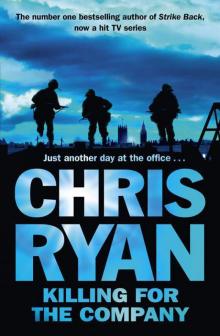 Killing for the Company
Killing for the Company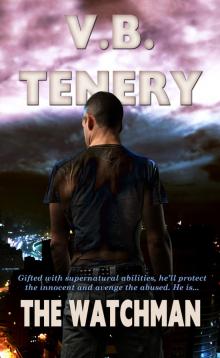 The Watchman
The Watchman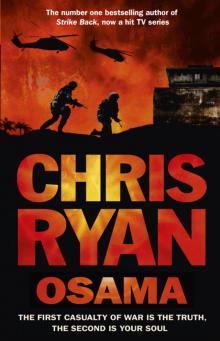 Osama
Osama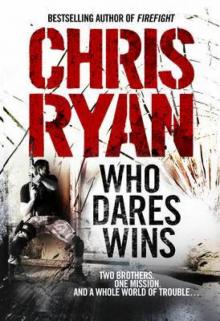 Who Dares Wins
Who Dares Wins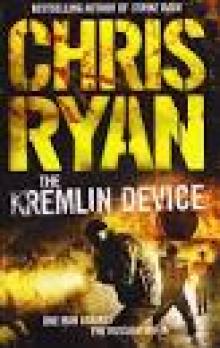 The Kremlin Device
The Kremlin Device Hunter Killer
Hunter Killer Alpha Force: Untouchable
Alpha Force: Untouchable Stand By Stand By
Stand By Stand By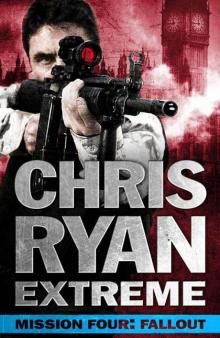 Chris Ryan Extreme: Hard Target: Mission Four: Fallout
Chris Ryan Extreme: Hard Target: Mission Four: Fallout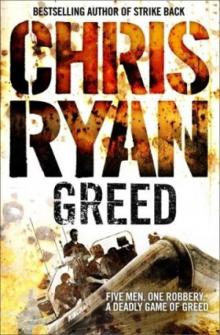 Greed mb-1
Greed mb-1 Alpha Force: Desert Pursuit
Alpha Force: Desert Pursuit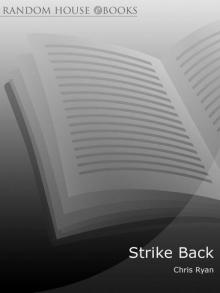 Strike Back
Strike Back Greed
Greed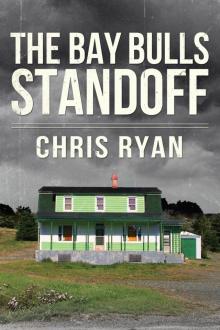 The Bay Bulls Standoff
The Bay Bulls Standoff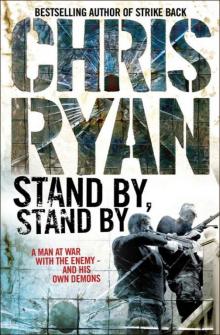 Stand By, Stand By gs-1
Stand By, Stand By gs-1 Outbreak
Outbreak Hunted
Hunted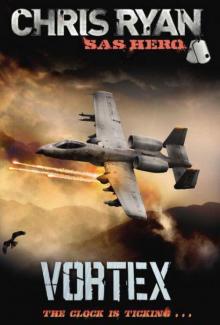 Vortex cr-4
Vortex cr-4 Rat-Catcher
Rat-Catcher Vortex
Vortex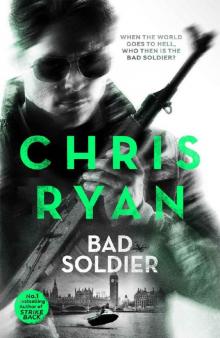 Bad Soldier
Bad Soldier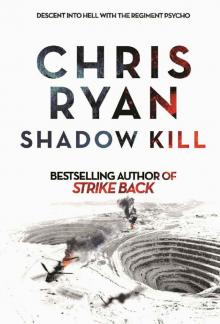 Shadow Kill: A Strikeback Novel
Shadow Kill: A Strikeback Novel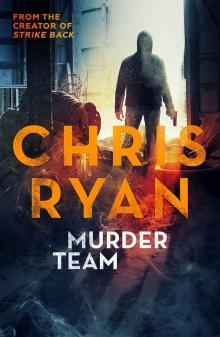 Murder Team (Kindle Single)
Murder Team (Kindle Single) One Good Turn
One Good Turn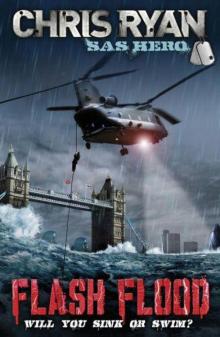 Flash Flood cr-1
Flash Flood cr-1 Night Strike
Night Strike Wildfire
Wildfire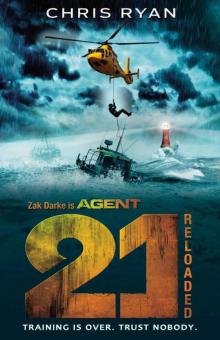 Agent 21: Reloaded: Book 2
Agent 21: Reloaded: Book 2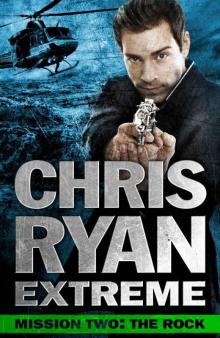 Chris Ryan Extreme: Hard Target: Mission Two: The Rock
Chris Ryan Extreme: Hard Target: Mission Two: The Rock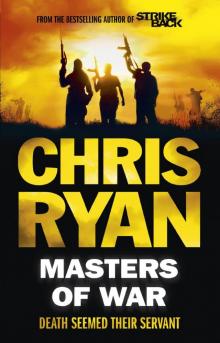 Masters of War
Masters of War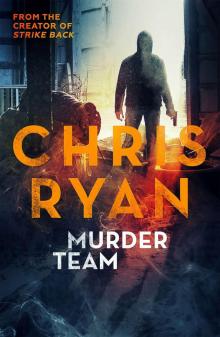 Murder Team
Murder Team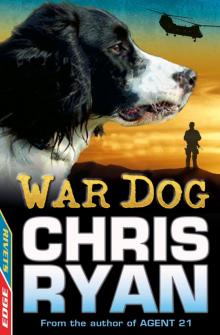 War Dog
War Dog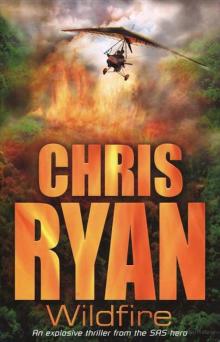 Wildfire cr-2
Wildfire cr-2 Survival
Survival The One That Got Away - Junior edition
The One That Got Away - Junior edition The Hit List
The Hit List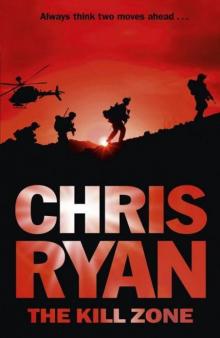 The Kill Zone
The Kill Zone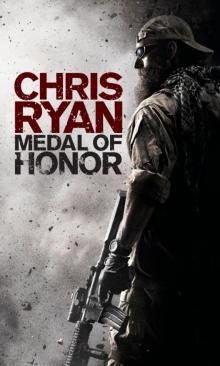 Medal of Honor
Medal of Honor Battleground
Battleground Twister
Twister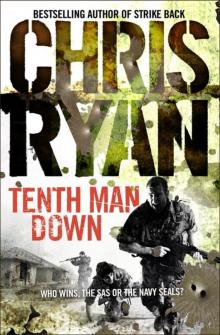 Tenth Man Down gs-4
Tenth Man Down gs-4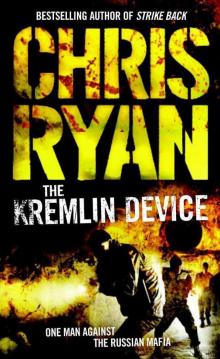 The Kremlin Device gs-3
The Kremlin Device gs-3 Hostage
Hostage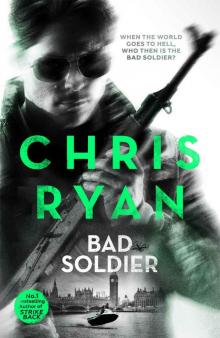 Bad Soldier: Danny Black Thriller 4
Bad Soldier: Danny Black Thriller 4 Alpha Force: Blood Money
Alpha Force: Blood Money Firefight
Firefight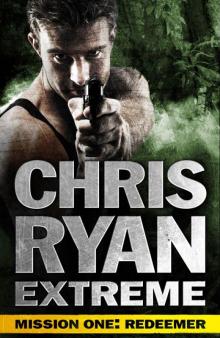 Chris Ryan Extreme: Hard Target: Mission One: Redeemer
Chris Ryan Extreme: Hard Target: Mission One: Redeemer Hit List
Hit List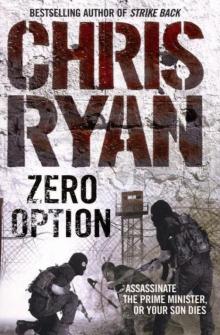 Zero Option gs-2
Zero Option gs-2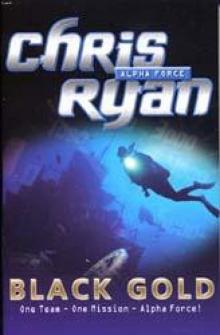 Black Gold
Black Gold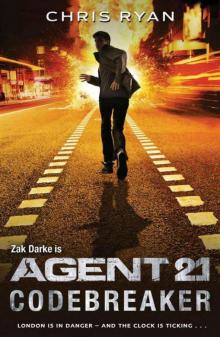 Agent 21: Codebreaker: Book 3
Agent 21: Codebreaker: Book 3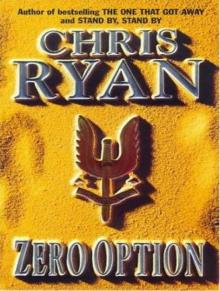 Zero Option
Zero Option Ultimate Weapon
Ultimate Weapon Tenth Man Down
Tenth Man Down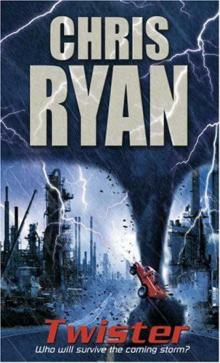 Twister cr-5
Twister cr-5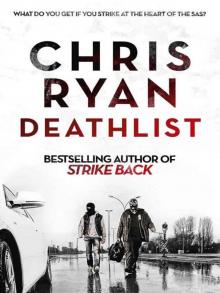 Deathlist
Deathlist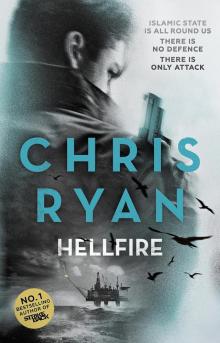 Hellfire
Hellfire Flash Flood
Flash Flood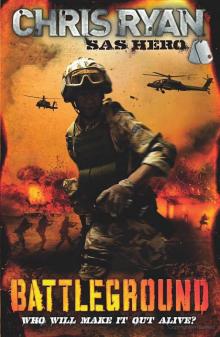 Battleground cr-6
Battleground cr-6 The Increment
The Increment